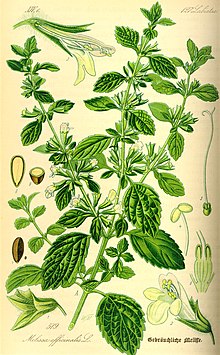Lemon Balm can go by many names: Apiatrum, Balm, Bee Balm, Bee’s Leaf, Honey Plan, Labiates, Lemon Fragrance, Melissa, and Sweet Balm. It is an herb from the mint family which is a very large family of herbs.
HISTORY

Lemon Balm originated in the Middle East and North Africa. It became naturalized in Europe in the 1500’s and to America by 1700’s. It is now grown all around the world. It has been in my garden for two years. Bee’s love this herb and apparently it can keep mosquitoes away; a win! Bees have a strong association to this plant according to both Greek and Roman cultures. Medicinal use of lemon balm can be dated to over 2000 years about through the Greeks and Romans. Thomas Jefferson cultivated it in the Gardens of Monticello.
Benefits
- Lemon Balm has many medicinal attributes including:
- Reduced Anxiety and Insomnia
- Calm the mind and encourage clear thinking.
- Anti-viral effect especially against herpes and cold sores.
- PMS symptom reduction including anxiety, cramping, and headache.
- Heart protection as can lower triglycerides, improve cholesterol synthesis, control heart palpitations, and lower blood pressure with regular use.
- Liver protection from the harmful effects of the Standard American Diet (SAD).
- Antibacterial and anti-fungal
- Diabetes help with controlling blood sugar levels and protecting the body against the oxidative stress that diabetes can cause.
- Anti-inflammatory and antioxidant protecting the body against disease and reducing pain levels.
- Cancer fighting as it has been shown to kill some cancer cell lines which include breast cancer, colorectal cancer, and aggressive brain cancer.
- Regulate an overactive thyroid.
- Aid digestion with its protectional effect on the gastrointestinal system and can help prevent gastric ulcers. It has been found beneficial in the treatment of constipation and colic.
- Alzheimer’s Disease and dementia can benefit from the use of lemon balm as it is believed to reduce damage from plaque-forming proteins. It is not considered a cure but has been observed to slow progression. It also can improve memory and problem-solving abilities.
- Healthy skin and reduction in signs of aging have been found when lemon balm is used on the skin.
Cautions
Lemon Balm is considered Generally Regarded as Safe (GRAS) for most people when used as a culinary herb and in tea form. Individuals with any type of thyroid challenge should not consume lemon balm without first discussing this with your health-care professional. This is especially true if you are on thyroid medication or have an underactive thyroid.
Overconsumption can cause headache, painful urination, nausea, vomiting, stomach pain, dizziness, and an allergic reaction.
Harvest and Storage
Lemon balm can be harvested throughout the growing season. The leaves can be used fresh or dried in a dehydrator for use later. Fresh leaves should be cleaned, water removed, and stored in the fridge either in a plastic bag or glass container. They can last up to 5 days. If you have dried the leaves in a dehydrator, store the dried leaves in a tinted glass container in a cool, dry spot. The dried leaves should be used within 6 months as the leaves will lose their flavor and medicinal potency. Fresh leaves can also be frozen in ice cube trays with olive or avocado oil to be used in cooking.

Serving Ideas
Lemon Balm Tea is one of the most common ways to enjoy it.
- 1 tablespoon fresh or 1 teaspoon dried lemon balm.
- Tear or crush the leaves, put in a tea ball or your cup.
- Pour boiling water over the tea ball or leaves. The tea should be infused for 5 to 15 minutes. Cover the cup while infusing to maintain the volatile oils. Remove tea ball or filter the water before consuming. A bit of honey can be added for a touch of sweetness.
Lemon Balm can pair well with asparagus, pasta, fish, poultry, or compound butter. It can be added to cookie batters or quick breads.
Lemon balm is pretty easy to grow like other plants from the mint family. Do you have lemon balm in your herb garden? Have you had lemon balm tea?
Be blessed and be a blessing,
Heather
Posts may contain affiliate links. If you purchase a product through an affiliate link, your costs will be the same but Chronicles in Health will receive a small commission. This helps cover some of the costs for this site. I appreciate your support!
The information, including but not limited to, text, graphics, images and other material contained on this website are for informational purposes only. The purpose of this website is to promote broad consumer understanding and knowledge of various health topics. It is not intended to be a substitute for professional medical advice, diagnosis or treatment. Always seek the advice of your physician or other qualified health care provider with any questions you may have regarding a medical condition or treatment and before undertaking a new health care regimen, and never disregard professional medical advice or delay in seeking it because of something you have read on this website.

